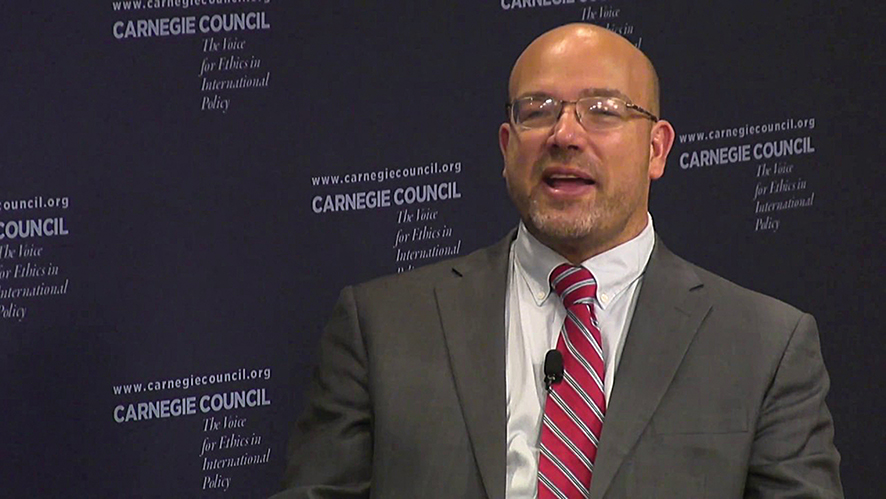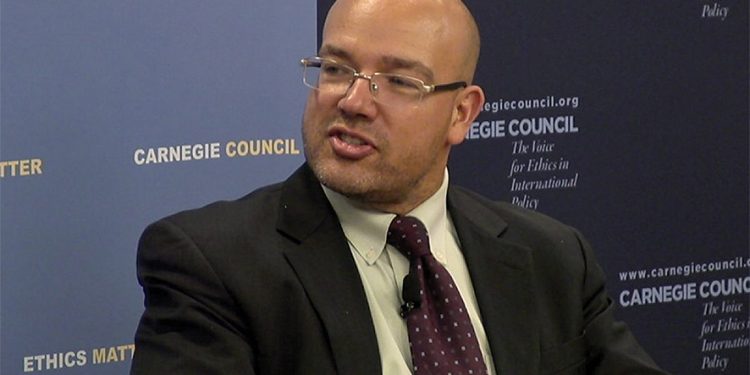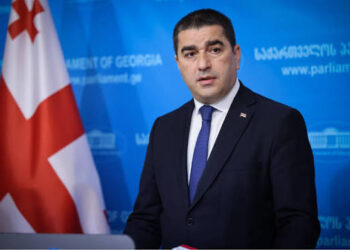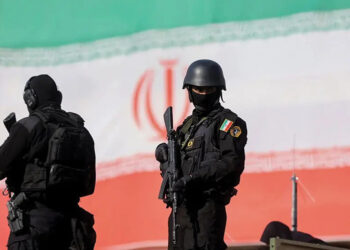Last week, Radio Free Europe’s Georgian Service sat down with Prof. Nikolas Gvosdev, a Russian-American international relations scholar, to discuss the outcomes of the NATO summit in Vilnius for Ukraine and Georgia.
Some dubbed the summit as “Bucharest revisited.” Is that a justifiable moniker?
In some ways, it was worse, because by keeping the Membership Action Plan requirements, Ukraine would have an understanding of what it would need to fulfill. Now, we have this very vague formulation that doesn’t give us a lot of clarity as to what the conditions are, when they should be met, or who will evaluate if those conditions have been met. So in some ways, this summit worsened Ukraine’s position in that Ukraine doesn’t have a clear invitation and it doesn’t have a timeline.
Could one argue that these half measures serve as an incentive for the Kremlin to never end the war?
Precisely. With so many Western leaders coming into Vilnius saying, “Ukraine is only in when the war is over,” then you’ve signaled to Moscow that the war can continue. This is why the Korea precedent is so important. Technically, there is still a state of war on the Korean peninsula, though there are not active military operations every day. They essentially signaled to Moscow, “don’t settle, just keep this going.”
The Russians have shown they can sustain a level of operations in Ukraine, and continue to wreck Ukraine in a way that makes the bill for reconstruction go up and up, and so as to make Ukraine even less attractive as a partner 2-3-4 years down the road.
Does NATO really have an open door policy?
It’s an open door policy where, in many cases, NATO countries are very, very eager for people not to voluntarily cross the threshold. And so, yes, the door is open, but “please, it’d be really wonderful if you didn’t actually take us up on it,” particularly with regards Ukraine and Georgia. What we’ve seen in Georgia is some politicians saying, “fine, if we’re not going to come in, then we’re not going to do any of the things you want because we know that we’re not going to cross the threshold anyway.”
And this actually hits on another point from NATO speak which is important, when we hear from its members, politicians, who say Ukraine is “virtually” a member of NATO, and some have said it about Georgia. But there’s no “virtual” membership. There’s no such concept: there is membership and there’s non-membership.
Now the third option, which would be one which we did not see at Vilnius, is NATO could introduce the concept of associations, that the alliance has “associations” with countries – not the partnerships and the Partnership for Peace we have, but associations that would have binding guarantees and commitments. But we saw no such move in Vilnius.
Pop culture references to the Ukraine war have come from Lord of the Rings, with Russia portrayed as Orcs. I don’t know if you’re a fan of Tolkien’s work, but this very much sounds like “hobbit politeness” – when they say “good day,” and they actually mean “good bye.”
I think that’s a great analogy: it is hobbit politeness. And it is habit politeness, because the US government wants to avoid saying no; they don’t want to say to Ukraine, Georgia, Azerbaijan or Moldova, “we don’t really want to bring you into NATO.” They don’t want to say “no,” so instead they say “the door is open.” But it is this the hobbit approach. And it is complicated by the fact that there are people, certainly within the US government, that do want to bring these countries in; but there is enough of this reluctance that it creates this impression. It doesn’t really help the countries to say “the door is open but don’t come in, you’re virtually a member” and then for them to be left holding the bag, as Georgia was in 2008, as Ukraine was in 2014, and again, after 2022, where you get hopes and prayers, sentiment, in the case of Ukraine, certainly a lot of military equipment and financial assistance, but no guarantee that the alliance is committed to reversing the Russian invasion.
Let’s talk about the US reluctance. How much a role does uncertainty about the upcoming elections play in all this?
A great deal. It has to do with assumptions that the Biden administration made about the timeline. If you look back eight, nine months ago, the US hope was that by the time Vilnius happened, Ukraine would have made substantial gains in its counter-offensive; that they would, if not have retaken Crimea and Donbas, then at least seriously damaged the Russian position. This was supposed to then allow for a discussion at Vilnius about security guarantees for Ukraine, where the fighting would essentially be at a stalemate on terms that would be favorable to Ukraine. What you now have is a US administration that is faced with an unpleasant dichotomy, which is: if you offer security guarantees to Ukraine, including a pathway to NATO membership, you are doing so at a time when Ukraine has not succeeded in regaining control of most of its lost territory. And so you’re either asking Ukraine to freeze the boundaries, the lines of control, as they exist now, or Ukraine says we need more time to engage in counter-offensive operations. But then, of course, the worry in the US is this is going to draw the US more directly into the conflict, which the Biden administration does not want on the eve of an election. The polling data in the US is quite clear: there’s strong support for supporting Ukraine, but there’s not a lot of support for direct US engagement or involvement in the conflict. The United States isn’t going to offer security guarantees while Ukraine itself is not happy with the current disposition of forces. And alongside this, I think we’re now beginning to realize that we overestimated Russia’s vulnerability to sanctions and underestimated their ability to repurpose old military equipment in Ukraine, which enables them to prolong the war.
Let’s talk about the Georgian backsliding and the West’s view of that.
Georgia and Georgian politicians have agency in the choices that Georgia makes. But what they are doing is getting NATO off the hook: “Well, the Georgians don’t want it, the Georgians aren’t working for it, the Georgians are backsliding, so now we’re free – we haven’t broken any of our promises. It’s the Georgians, right?” So this is almost saying, “Well, this is good that you have the current government, because it gets NATO countries off the hook.” I’m being very cynical about this, but why did the Obama administration not protest the elections more in 2009-2010 in Ukraine that brought Yanukovych back to the presidency? Because Yanukovych got the US off the hook with regards to NATO. If Timoshenko had won the elections and become President of Ukraine, the questions we’re hearing in Vilnius today would have come a decade earlier.
If there are new elections in Georgia and a change of government, one that is committed to restarting full force Georgia’s Western integration, you’re going to have the same set of problems of a NATO and EU that is unprepared to deal with it.

Georgia’s stance has also been a subject of debate. Is Tbilisi being pragmatic or pro-Russian?
I think they’re being pragmatic, given the neighborhood Georgia is in, given the extent to which the commitments are not forthcoming. Taking steps toward Russia would be bad for Georgia, but they are without guarantees that NATO, the European Union, the United States, will be a backstop. It’s hard to tell a country that you should do something that will damage your national interests in the short run, but that we are not prepared to provide guarantees for the long run. I don’t find that Georgia is pro-Russian; I think Georgia is seeking to do things that are good for Georgia. Now, Georgians can disagree whether they’re good for Georgia or not, but I don’t think the starting point is a particular love of Russia; I think it’s a sense of how does Georgia get out of this crisis that the Ukrainian invasion has caused? You live in a neighborhood where the Armenians and Azerbaijanis are also failing to create stability for you. You have Iran to the south, you have a Turkey that’s unpredictable. Georgia needs to do things that will keep it from being drawn into problems to which other countries are not necessarily going to provide the solution. So I don’t see it as pro-Russian.
The sentiment in Georgia, at least in Tbilisi that I saw, is very supportive of Ukraine. There’s recognition that what Ukraine is going through is what Georgia has been through, but that right now Georgia needs to be kept out of the fighting; it needs to stay as safe as it can. And if that means that some of this is facilitating trade with Russia, allowing Georgia to be a safety valve for Russians coming out, if that’s the price for keeping the pressure off Georgia, I can understand it. I think there has to be that understanding in western capitals that Georgia is in a dangerous neighborhood right now. It’s always been a dangerous neighborhood, but it’s particularly dangerous right now. And Georgia needs to be looking out for Georgia at this point.
There a fine line between being pragmatic and making so many concessions that you end up in Russia’s orbit, just as Armenia did back in the day.
That’s where statesmen and politicians have to be very careful, because a pragmatic approach can then lead you to start taking steps down the road where all of a sudden, you find yourself in an orbit that you can’t break out of. Careful calibration is important. This is where the debate comes in as to what extent the current government is being reckless in adopting a pragmatic approach, but not putting in those safeguards to make sure that it doesn’t pull Georgia unwillingly down. Such safeguards as no movement on anything that would compromise support for Ukraine’s territorial integrity, certainly not as long as Georgia’s own territorial integrity has been violated. Safeguards like making it clear that it’s not going to be business as usual. Easier said than done, but there are symbolic steps that can be taken. What we’ve seen in Turkey is real business relations, but not business as usual, and them saying “this will not preclude us from supporting Ukraine and NATO, supporting the idea that Crimea is Ukrainian territory. The fact that we have a business relationship with Russia is not going to lead to these other steps.”
It is problematic for Georgia, obviously, and includes domestic issues, namely, the Ukrainian government wanting to intercede for former President Saakashvili, and to see that not simply as a Georgian matter, but as a matter of bilateral relations between Georgia and Ukraine, given his joint role in both countries. I don’t think it’s beneficial for the current Georgian government to allow this to continue the way it has, essentially seeing the former president in danger of dying, or his medical condition being such that it creates concerns, and having this be an irritant in Georgia’s relationship with Ukraine. Because that’s where pragmatism is a thing that has the potential then to push Georgia further into the Russian orbit.
There are fears that Georgia will end up a bargaining chip on the end-of-war negotiating table, and the West will say to Georgia: You are pro-Russian, so you might as well stay with Russia.
There’s always the concern that the Caucasus will get sold out. In the West, we have a long history of that. I think Georgia needs to forestall that. And it’s not just a matter of from one government to the next: this is where the business community and others really need to come in to build Georgia’s role in the middle corridor from China across Central Asia, across the Caspian into the Black Sea region. There is a case to be made very strongly that connecting the Euro Atlantic Indo Pacific land corridor, not just the maritime land corridor, requires a stable middle corridor. It requires that that middle court and the West have to be involved and engaged. Some might argue Georgia can be written off, because it’s too far away and the current government may be perceived as too pro-Russian. That’s strategic short-sightedness on the West’s part. Georgia is integral to a Western strategy of connectivity. The northern route is closed. My prediction is that you are going to see a new wall emerging on Russia’s western borders, linkages are going to be interrupted, the last linkages across Ukraine are going to disappear -gas, transit, all of that, that corridor is closed, and the corridor that runs through Iran is unstable. Georgia is integral to this east-west connectivity. And it’s not about nostalgia or sentiment, it is about practicality. This is where the Georgian government’s pragmatism has to also be directed to the West, to say “it’s in your pragmatic business security interests that Georgia be a part of this this middle corridor that has to remain open, has to remain functional.”
Interview by Vazha Tavberidze














